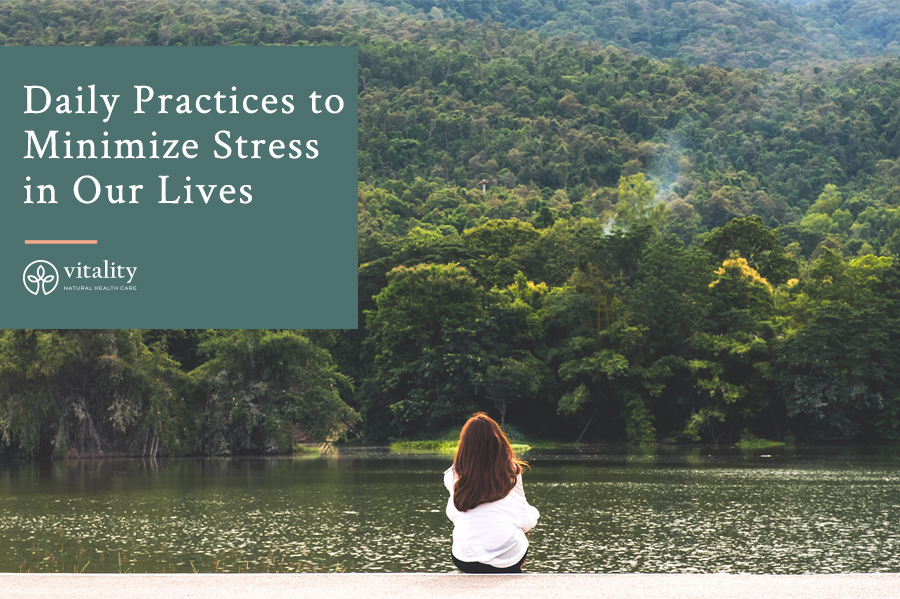Advances in research and technology are supposed to make life easier and less stressful, but in actuality, these things often create more stress. They give us more choices and opportunities to be engaged and involved, increasing our ability to do more and along with that, the expectation to be more productive.
The act of doing and always being engaged can increase our stress, but I want to offer some tools and daily practices in this blog post that will help you to minimize the stress that comes with living in a fast-paced, modern, technologically advanced world.
I come from a culture in Ecuador where life moves a bit slower, so one of the first daily practices to minimize stress that I want to offer you is to PA– USE.
Stress is not going to go away, whether you live in the United States or in Ecuador. We will always have demands on our time, physical demands on our body, family stress, and work stress, but pausing creates the time and space we need to become aware and understand the causes of our stress and how we react to those stressors.
Awareness is key if we want to change the way we react to stress and the impact that stress has on our body, mind, and spirit.
For example, if someone cuts you off on the freeway, you will naturally have a physiological response. You may experience an increase in your heart rate, rise in body temperature, or negative thoughts about yourself or the driver that cut you off.
This response is a natural one, but instead of letting the stress of the situation continue to affect you hours or even days later, you have the power to control the way it affects you in the long-run.
Instead of choosing to be angry and resentful every time you see a car that looks like the one that cut you off, you can choose in the moment to accept what happened, be grateful for your safety, and shift your interpretation of the situation.
Perhaps the driver that cut you off was late for work, or in a hurry to get to their child’s school to drop off a forgotten lunch box. We’ll never know, but we can choose in the moment to have compassion for them and whatever circumstances led to them make the choice to cut you off on the freeway.
The ability to shift your thinking and react differently increases your resilience to stress.
You’ll have the natural physiological response which causes an increase in stress hormones, like cortisol and epinephrine, but your body is also able to settle after the situation is over and return to its natural state of equilibrium.
This decreases your risk of developing the diseases and conditions that are caused by chronic and ongoing stress.
By pausing, you’ve actually created the space to accomplish the following:
- Become aware of your stress and what triggered it.
- Understand the way your body and mind react to stress.
- Shift the way you respond to stress, in body and mind.
You can, of course, use these principles for any situation, not just when someone cuts you off on the freeway!
So now you know how to manage stress in the moment, but what can you do on a regular basis to make it easier to pause when stressful situations arise?
1. Slow Down
The busier you are, the more you need to slow down.
I give this advice to my team at Vitality Natural Health Care all the time. We run a very busy practice and it’s very easy to react to the busyness of it and lose track of what’s happening in the moment. When this happens, mistakes increase – so not only are we stressed because we’re busy, but we’re also stressed because mistakes are being made and have to be fixed.
Even if you’re not busy, I encourage you to slow down.
Slow down your movements – walk slower, speak more slowly and intentionally, take your time to think things through – so your nervous system isn’t always in a state of hyperarousal, but is able to rest and relax.
This will also help you to respond more rationally when stressful situations do arise.
2. Breathe
The way you breathe affects your heart rate and can either send the signal to your nervous system that it can relax or that it needs to be on the alert.
Set aside a few times each day to notice your breath, and make time for relaxing breathing exercises.
These are some of my favorites:
You may not have the time to do these exercises during a stressful situation, but practicing them in on a regular basis, several times a day will help to increase your resilience to stress and support your body’s natural need for homeostasis and regulation.
Breathing is a tool that I rely on often to manage stress. On days when I feel overwhelmed with what’s happening in the clinic, I find a quiet space, close my eyes, and focus on my breath for a few minutes – taking slow, deep breaths in and out.
I can’t eliminate the stress right way, but I can control my reaction to it.
3. Spend time in Nature
Put your phone down, go outdoors, and smell the flowers, literally.
Being outdoors with trees and grass, away from technology, makes it a little easier to slow down. So, if you can, find a nearby park, hiking trail, or your backyard and set aside 5-10 minutes to feel the warmth of the sun on your skin, watch the clouds float by, smell the flowers, or feel the leaves.
We can’t run away from or eliminate stress completely, but we can preserve our physical and mental wellness in the midst of it.
xo,


